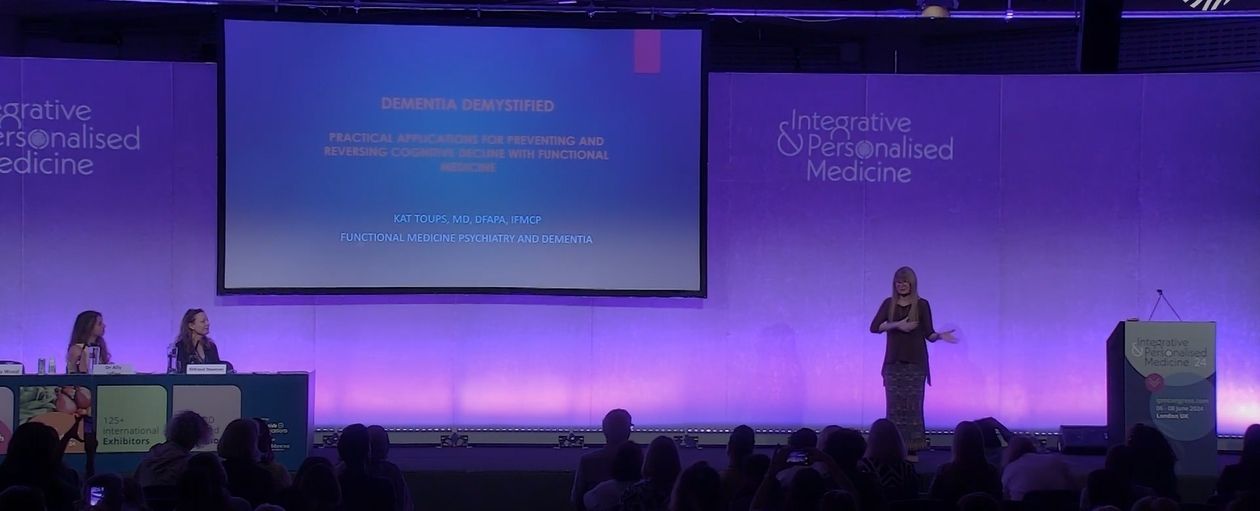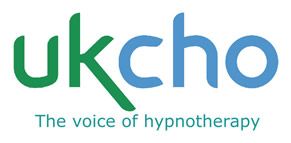The Science of Reversing Dementia: Insights from Dr. Kat Toups at IPM Congress 2024 - Ketogenic Diet Dementia

🏠︎ | Past Presentations | Integrative Mental Health | The Science of Reversing Dementia
- Event: IPM Congress 2024
- Date: 6th June 2024
- By: Dr. Kat Toupe
- Estimated Read Time: 12–14 minutes
Introduction: Exploring New Horizons in Dementia Treatment
At the IPM Congress 2024, Dr. Kat Toups, a renowned geriatric psychiatrist, delivered an inspiring session on "The Science of Reversing Dementia." Tackling this daunting topic with both professional expertise and personal experience as a patient, Dr. Toups challenged the conventional perception of dementia as an irreversible condition. Her session offered fresh perspectives on preventive and therapeutic approaches that could revolutionise cognitive decline management, underscoring the significant impact of epigenetic factors dementia.
Dementia: A Treatable Condition?
Dr. Toups opened with a provocative question: "How many believe dementia is an inevitable death sentence?" To her audience's surprise, she asserted that dementia is indeed both preventable and treatable when its root causes are addressed. She emphasised that, instead of genetics alone, a plethora of treatable and reversible factors, including dietary and lifestyle choices, contribute to the onset of cognitive decline reversal.
Innovative Clinical Trial Findings
Highlighting her groundbreaking work, Dr. Toups detailed the methodology and outcomes of the Four Winds clinical trial. This study, involving 25 patients with varied dementia stages, demonstrated that 84% of participants showed cognitive improvement through a 9-month regimen focused on a ketogenic diet dementia, exercise, and a holistic health approach. Notably, even MRI scans reflected unexpected increases in brain grey matter volume, challenging the belief that structural improvements in the brain were unattainable at such stages.
Foundations of Cognitive Health
Dr. Toups's approach integrates a comprehensive health strategy encompassing diet, exercise, and mindfulness. Key elements include:
- Dietary Influence: A ketogenic, grain-free, and organic diet was fundamental, with Dr. Toups noting that deeper ketosis consistently correlated with enhanced cognitive function.
- Exercise and Brain Training: Participants engaged in varied physical activities and used the Brain HQ program to sharpen cognitive faculties, evidencing exercise's critical role in promoting neuroplasticity and blood flow.
- Mindfulness and Stress Management: Using methods like HeartMath, patients were encouraged to practice mindfulness, further proving the significance of stress reduction on brain health.
Biometrics and Genetic Testing
Dr. Toups emphasised the importance of comprehensive testing to cast a wide net for potential causes of neurodegeneration. This included genetic testing, which has become increasingly sophisticated, revealing potential actionable insights, such as specific nutrient deficiencies related to epigenetic factors dementia.
Addressing Toxins and Infections
A focal point of Dr. Toups's discussion was the impact of environmental factors, such as mold and chronic infections, on cognitive health. Her findings stress the need for effective detection and mitigation strategies to counteract the deleterious effects of such toxins.
The Role of Hormones in Brain Health
Hormone optimisation emerged as another crucial element in Dr. Toups's protocol. Aging-related declines in hormones like estrogen and testosterone can have profound impacts on cognitive function; thus, their restoration was highlighted as a significant protective measure against neurodegeneration.
Conclusion: Renewed Hope for Dementia Patients
Dr. Toups concluded with a hopeful assertion: "Dementia is not a death sentence." By revealing actionable insights and implementing a personalised, precision medicine approach, there lies abundant potential to halt, and even reverse, cognitive decline. Her findings pave the way for an evolved understanding of dementia, encouraging both the healthcare community and patients to reconsider traditional narratives and embrace a multi-faceted treatment paradigm, including strategies like a ketogenic diet dementia for improved outcomes.
Readers are urged to reflect on these insights and consider the broader implications for dementia prevention and treatment strategies, as personalized medicine holds promise for revolutionising approaches to cognitive health maintenance and improvement. For those interested in delving deeper, Dr. Toups's detailed slides and references, available post-conference, offer a wealth of additional knowledge to explore.
Further Reading
For those interested in exploring Dr. Kat Toups's extensive work on reversing dementia and cognitive decline, here are some recommended articles and resources:
-
Dr. Kat Toups ' The Science of Reversing Dementia
An insightful interview where Dr. Toups shares her personal journey of reversing her own cognitive decline and discusses her clinical trial using functional medicine to treat dementia. -
How To Prevent and Reverse Dementia | Dementia Prevention
In this comprehensive interview, Dr. Toups delves into how dementia and cognitive decline can be prevented and reversed by addressing factors affecting brain function, including diet, exercise, toxins, infections, hormone deficiencies, stress, and inflammation. -
Dementia Demystified: Reversing Cognitive Decline and Dementia with Functional Medicine
A digital seminar where Dr. Toups discusses the functional medicine approach she used to reverse her own dementia and applies with her patients, focusing on evaluating and testing patients to determine the root causes of their illness. -
Precision Medicine Approach Reverses Early-Stage Dementia
An article highlighting a study led by Dr. Toups, demonstrating that a precision medicine approach can reverse early-stage dementia, offering hope for patients and caregivers. -
How to Prevent & Reverse Dementia | Psychiatrist Kat Toups, M.D.
A podcast episode where Dr. Toups shares her daily tips to prevent cognitive decline, discussing lifestyle changes, diet, exercise, and oral health as pivotal factors in cognitive wellness.
For more resources and transcribed sessions from the Integrative Mental Health Conference, visit our Integrative Mental Health Conference page.
Get Access to the Full Conference Recording!
Submit the form below to unlock the complete video recording - don't miss out on insights from leading experts and thought leaders!
)
)
)

.jpg.png)
|https://cdn.asp.events/CLIENT_Progress_084371A2_5056_B739_5406DC209314F095/sites/IPM-2025/media/libraries/exhibitors/Apex-Energetics.png/fit-in/640x9999/filters:no_upscale())
|https://cdn.asp.events/CLIENT_Progress_084371A2_5056_B739_5406DC209314F095/sites/IPM-2025/media/libraries/exhibitors/Pure-Encapsulations-NEW3.jpg/fit-in/640x9999/filters:no_upscale())
|https://cdn.asp.events/CLIENT_Progress_084371A2_5056_B739_5406DC209314F095/sites/IPM-2025/media/libraries/exhibitors/Nordic labs NEW.png/fit-in/640x9999/filters:no_upscale())
|https://cdn.asp.events/CLIENT_Progress_084371A2_5056_B739_5406DC209314F095/sites/IPM-2025/media/libraries/exhibitors/Nelsons Corporate logo.jpg/fit-in/640x9999/filters:no_upscale())
|https://cdn.asp.events/CLIENT_Progress_084371A2_5056_B739_5406DC209314F095/sites/IPM-2025/media/libraries/exhibitors/Lingo_Made-by-Abbott-002-crop.png/fit-in/640x9999/filters:no_upscale())
|https://cdn.asp.events/CLIENT_Progress_084371A2_5056_B739_5406DC209314F095/sites/IPM-2025/media/libraries/exhibitors/Venn-Healthcare.png/fit-in/640x9999/filters:no_upscale())
|https://cdn.asp.events/CLIENT_Progress_084371A2_5056_B739_5406DC209314F095/sites/IPM-2025/media/libraries/exhibitors/Pharma-Nord-logo-full-size.jpg/fit-in/640x9999/filters:no_upscale())
|https://cdn.asp.events/CLIENT_Progress_084371A2_5056_B739_5406DC209314F095/sites/IPM-2025/media/libraries/exhibitors/Vibrant-Wellness.png/fit-in/640x9999/filters:no_upscale())
|https://cdn.asp.events/CLIENT_Progress_084371A2_5056_B739_5406DC209314F095/sites/IPM-2025/media/libraries/exhibitors/Nutrined.png/fit-in/640x9999/filters:no_upscale())
|https://cdn.asp.events/CLIENT_Progress_084371A2_5056_B739_5406DC209314F095/sites/IPM-2025/media/libraries/exhibitors/HealthMedica.jpg/fit-in/640x9999/filters:no_upscale())
|https://cdn.asp.events/CLIENT_Progress_084371A2_5056_B739_5406DC209314F095/sites/IPM-2025/media/libraries/exhibitors/Form-Med.png/fit-in/640x9999/filters:no_upscale())
|https://cdn.asp.events/CLIENT_Progress_084371A2_5056_B739_5406DC209314F095/sites/IPM-2025/media/libraries/exhibitors/QMed-Swiss-crop.png/fit-in/640x9999/filters:no_upscale())
|https://cdn.asp.events/CLIENT_Progress_084371A2_5056_B739_5406DC209314F095/sites/IPM-2025/media/libraries/exhibitors/Vitaspan.png/fit-in/640x9999/filters:no_upscale())
|https://cdn.asp.events/CLIENT_Progress_084371A2_5056_B739_5406DC209314F095/sites/IPM-2025/media/libraries/exhibitors/Maven-Health.png/fit-in/640x9999/filters:no_upscale())
|https://cdn.asp.events/CLIENT_Progress_084371A2_5056_B739_5406DC209314F095/sites/IPM-2025/media/libraries/exhibitors/HumanFirst.jpg/fit-in/640x9999/filters:no_upscale())
|https://cdn.asp.events/CLIENT_Progress_084371A2_5056_B739_5406DC209314F095/sites/IPM-2025/media/libraries/exhibitors/Hardy-Nutritionals.jpg/fit-in/640x9999/filters:no_upscale())
|https://cdn.asp.events/CLIENT_Progress_084371A2_5056_B739_5406DC209314F095/sites/IPM-2025/media/libraries/exhibitors/W_Wellness.png/fit-in/640x9999/filters:no_upscale())
|https://cdn.asp.events/CLIENT_Progress_084371A2_5056_B739_5406DC209314F095/sites/IPM-2025/media/libraries/exhibitors/Nuzest-logo.png/fit-in/640x9999/filters:no_upscale())
|https://cdn.asp.events/CLIENT_Progress_084371A2_5056_B739_5406DC209314F095/sites/IPM-2025/media/libraries/exhibitors/Oryx.jpg/fit-in/640x9999/filters:no_upscale())
|https://cdn.asp.events/CLIENT_Progress_084371A2_5056_B739_5406DC209314F095/sites/IPM-2025/media/libraries/exhibitors/Microba.jpg/fit-in/640x9999/filters:no_upscale())
|https://cdn.asp.events/CLIENT_Progress_084371A2_5056_B739_5406DC209314F095/sites/IPM-2025/media/libraries/exhibitors/BlueOak.png/fit-in/640x9999/filters:no_upscale())
|https://cdn.asp.events/CLIENT_Progress_084371A2_5056_B739_5406DC209314F095/sites/IPM-2025/media/libraries/exhibitors/Dimples.png/fit-in/640x9999/filters:no_upscale())
|https://cdn.asp.events/CLIENT_Progress_084371A2_5056_B739_5406DC209314F095/sites/IPM-2025/media/libraries/exhibitors/BetterYou.jpg/fit-in/640x9999/filters:no_upscale())
|https://cdn.asp.events/CLIENT_Progress_084371A2_5056_B739_5406DC209314F095/sites/IPM-2025/media/libraries/exhibitors/L-Nutra-Health.png/fit-in/640x9999/filters:no_upscale())
.png/fit-in/320x9999/filters:no_upscale()|https://cdn.asp.events/CLIENT_Progress_084371A2_5056_B739_5406DC209314F095/sites/IPM-2025/media/libraries/exhibitors/MicrosoftTeams-image-(3).png/fit-in/640x9999/filters:no_upscale())
|https://cdn.asp.events/CLIENT_Progress_084371A2_5056_B739_5406DC209314F095/sites/IPM-2025/media/libraries/exhibitors/ABNOBA.jpg/fit-in/640x9999/filters:no_upscale())
|https://cdn.asp.events/CLIENT_Progress_084371A2_5056_B739_5406DC209314F095/sites/IPM-2025/media/libraries/exhibitors/GLXG.png/fit-in/640x9999/filters:no_upscale())
|https://cdn.asp.events/CLIENT_Progress_084371A2_5056_B739_5406DC209314F095/sites/IPM-2025/media/libraries/exhibitors/Eagle-Clinical.png/fit-in/640x9999/filters:no_upscale())
|https://cdn.asp.events/CLIENT_Progress_084371A2_5056_B739_5406DC209314F095/sites/IPM-2025/media/libraries/exhibitors/Regenerative-Omegas_Ahiflower.png/fit-in/640x9999/filters:no_upscale())
|https://cdn.asp.events/CLIENT_Progress_084371A2_5056_B739_5406DC209314F095/sites/IPM-2025/media/libraries/exhibitors/Virun.jpg/fit-in/640x9999/filters:no_upscale())
|https://cdn.asp.events/CLIENT_Progress_084371A2_5056_B739_5406DC209314F095/sites/FIMedicine-2022/media/libraries/exhibitors/Altruvita.png/fit-in/640x9999/filters:no_upscale())
|https://cdn.asp.events/CLIENT_Progress_084371A2_5056_B739_5406DC209314F095/sites/IPM-2025/media/libraries/exhibitors/Terranova.png/fit-in/640x9999/filters:no_upscale())
|https://cdn.asp.events/CLIENT_Progress_084371A2_5056_B739_5406DC209314F095/sites/FIMedicine-2022/media/libraries/exhibitors/Proven-Biotics.png/fit-in/640x9999/filters:no_upscale())
|https://cdn.asp.events/CLIENT_Progress_084371A2_5056_B739_5406DC209314F095/sites/IPM-2025/media/libraries/exhibitors/PROTINA.jpg/fit-in/640x9999/filters:no_upscale())
|https://cdn.asp.events/CLIENT_Progress_084371A2_5056_B739_5406DC209314F095/sites/IPM-2025/media/libraries/exhibitors/Rayonex-hi-res.jpg/fit-in/640x9999/filters:no_upscale())
|https://cdn.asp.events/CLIENT_Progress_084371A2_5056_B739_5406DC209314F095/sites/IPM-2025/media/libraries/exhibitors/RegenerusLabs.png/fit-in/640x9999/filters:no_upscale())
|https://cdn.asp.events/CLIENT_Progress_084371A2_5056_B739_5406DC209314F095/sites/IPM-2025/media/libraries/exhibitors/Bristol-Fungarium.png/fit-in/640x9999/filters:no_upscale())
|https://cdn.asp.events/CLIENT_Progress_084371A2_5056_B739_5406DC209314F095/sites/IPM-2025/media/libraries/exhibitors/Doctors-Data.png/fit-in/640x9999/filters:no_upscale())
|https://cdn.asp.events/CLIENT_Progress_084371A2_5056_B739_5406DC209314F095/sites/IPM-2025/media/libraries/exhibitors/TheraLogo_2_Grey_v2.png/fit-in/640x9999/filters:no_upscale())
|https://cdn.asp.events/CLIENT_Progress_084371A2_5056_B739_5406DC209314F095/sites/IPM-2025/media/libraries/exhibitors/Pure-Maintenance-NEW.png/fit-in/640x9999/filters:no_upscale())
|https://cdn.asp.events/CLIENT_Progress_084371A2_5056_B739_5406DC209314F095/sites/IPM-2025/media/libraries/exhibitors/TotallyDerma.png/fit-in/640x9999/filters:no_upscale())
|https://cdn.asp.events/CLIENT_Progress_084371A2_5056_B739_5406DC209314F095/sites/IPM-2025/media/libraries/exhibitors/Natroceutics.png/fit-in/640x9999/filters:no_upscale())
|https://cdn.asp.events/CLIENT_Progress_084371A2_5056_B739_5406DC209314F095/sites/IPM-2025/media/libraries/exhibitors/OMED-Health.jpg/fit-in/640x9999/filters:no_upscale())
|https://cdn.asp.events/CLIENT_Progress_084371A2_5056_B739_5406DC209314F095/sites/IPM-2025/media/libraries/exhibitors/Tigon.jpg/fit-in/640x9999/filters:no_upscale())
|https://cdn.asp.events/CLIENT_Progress_084371A2_5056_B739_5406DC209314F095/sites/IPM-2025/media/libraries/exhibitors/Ancient---Brave.png/fit-in/640x9999/filters:no_upscale())
|https://cdn.asp.events/CLIENT_Progress_084371A2_5056_B739_5406DC209314F095/sites/IPM-2025/media/libraries/exhibitors/Wild-Nutrition_2.png/fit-in/640x9999/filters:no_upscale())
|https://cdn.asp.events/CLIENT_Progress_084371A2_5056_B739_5406DC209314F095/sites/IPM-2025/media/libraries/exhibitors/DR.Vegan.png/fit-in/640x9999/filters:no_upscale())
|https://cdn.asp.events/CLIENT_Progress_084371A2_5056_B739_5406DC209314F095/sites/IPM-2025/media/libraries/exhibitors/Nutri-Link.png/fit-in/640x9999/filters:no_upscale())
|https://cdn.asp.events/CLIENT_Progress_084371A2_5056_B739_5406DC209314F095/sites/IPM-2025/media/libraries/exhibitors/BodyBio-NEW.jpg/fit-in/640x9999/filters:no_upscale())
|https://cdn.asp.events/CLIENT_Progress_084371A2_5056_B739_5406DC209314F095/sites/IPM-2025/media/libraries/exhibitors/Herrens-Mark.png/fit-in/640x9999/filters:no_upscale())
|https://cdn.asp.events/CLIENT_Progress_084371A2_5056_B739_5406DC209314F095/sites/IPM-2025/media/libraries/exhibitors/BioCare_Logo_750x750.jpg/fit-in/640x9999/filters:no_upscale())
|https://cdn.asp.events/CLIENT_Progress_084371A2_5056_B739_5406DC209314F095/sites/IPM-2025/media/logos/HifasDaTerra.png/fit-in/640x9999/filters:no_upscale())
|https://cdn.asp.events/CLIENT_Progress_084371A2_5056_B739_5406DC209314F095/sites/IPM-2025/media/libraries/exhibitors/AONM.jpg/fit-in/640x9999/filters:no_upscale())
|https://cdn.asp.events/CLIENT_Progress_084371A2_5056_B739_5406DC209314F095/sites/IPM-2025/media/libraries/exhibitors/KBMO-Diagnostics.png/fit-in/640x9999/filters:no_upscale())
|https://cdn.asp.events/CLIENT_Progress_084371A2_5056_B739_5406DC209314F095/sites/IPM-2025/media/libraries/exhibitors/Keto-Mojo-Logo.new.jpg/fit-in/640x9999/filters:no_upscale())
|https://cdn.asp.events/CLIENT_Progress_084371A2_5056_B739_5406DC209314F095/sites/IPM-2025/media/logos/LifecodeGX.jpg.png/fit-in/640x9999/filters:no_upscale())
|https://cdn.asp.events/CLIENT_Progress_084371A2_5056_B739_5406DC209314F095/sites/IPM-2025/media/libraries/exhibitors/Iscador.jpg/fit-in/640x9999/filters:no_upscale())
|https://cdn.asp.events/CLIENT_Progress_084371A2_5056_B739_5406DC209314F095/sites/IPM-2025/media/libraries/exhibitors/Invivo.png/fit-in/640x9999/filters:no_upscale())
|https://cdn.asp.events/CLIENT_Progress_084371A2_5056_B739_5406DC209314F095/sites/IPM-2025/media/logos/Helixor70.jpg/fit-in/640x9999/filters:no_upscale())
|https://cdn.asp.events/CLIENT_Progress_084371A2_5056_B739_5406DC209314F095/sites/IPM-2025/media/logos/Geneva.png/fit-in/640x9999/filters:no_upscale())
|https://cdn.asp.events/CLIENT_Progress_084371A2_5056_B739_5406DC209314F095/sites/IPM-2025/media/libraries/exhibitors/Really-Healthy-NEW.png/fit-in/640x9999/filters:no_upscale())
|https://cdn.asp.events/CLIENT_Progress_084371A2_5056_B739_5406DC209314F095/sites/IPM-2025/media/libraries/exhibitors/Lamberts-NEW.png/fit-in/640x9999/filters:no_upscale())
|https://cdn.asp.events/CLIENT_Progress_084371A2_5056_B739_5406DC209314F095/sites/IPM-2025/media/libraries/exhibitors/Bare-Biology-Logo.jpg/fit-in/640x9999/filters:no_upscale())
|https://cdn.asp.events/CLIENT_Progress_084371A2_5056_B739_5406DC209314F095/sites/IPM-2025/media/libraries/exhibitors/FunctionalMind.png/fit-in/640x9999/filters:no_upscale())
|https://cdn.asp.events/CLIENT_Progress_084371A2_5056_B739_5406DC209314F095/sites/IPM-2025/media/libraries/exhibitors/The-Natural-Dispensary-NEW.jpg/fit-in/640x9999/filters:no_upscale())
|https://cdn.asp.events/CLIENT_Progress_084371A2_5056_B739_5406DC209314F095/sites/IPM-2025/media/libraries/exhibitors/Metagenics.jpg/fit-in/640x9999/filters:no_upscale())
|https://cdn.asp.events/CLIENT_Progress_084371A2_5056_B739_5406DC209314F095/sites/IPM-2025/media/libraries/exhibitors/Weleda-NEW.png/fit-in/640x9999/filters:no_upscale())
|https://cdn.asp.events/CLIENT_Progress_084371A2_5056_B739_5406DC209314F095/sites/IPM-2025/media/libraries/exhibitors/Viridian-Logo---MASTER-V3_Viridian-Logotype---Tag.png/fit-in/640x9999/filters:no_upscale())
|https://cdn.asp.events/CLIENT_Progress_084371A2_5056_B739_5406DC209314F095/sites/IPM-2025/media/libraries/exhibitors/CytoplanCropped.jpg/fit-in/640x9999/filters:no_upscale())
|https://cdn.asp.events/CLIENT_Progress_084371A2_5056_B739_5406DC209314F095/sites/IPM-2025/media/libraries/exhibitors/Balance-Healthcare-New.png/fit-in/640x9999/filters:no_upscale())
|https://cdn.asp.events/CLIENT_Progress_084371A2_5056_B739_5406DC209314F095/sites/IPM-2025/media/libraries/exhibitors/OxfordHealthspan1.png/fit-in/640x9999/filters:no_upscale())
|https://cdn.asp.events/CLIENT_Progress_084371A2_5056_B739_5406DC209314F095/sites/IPM-2025/media/libraries/exhibitors/Colab-Services.jpg/fit-in/640x9999/filters:no_upscale())
|https://cdn.asp.events/CLIENT_Progress_084371A2_5056_B739_5406DC209314F095/sites/IPM-2025/media/libraries/exhibitors/BOIRONcrop.jpg/fit-in/640x9999/filters:no_upscale())
)
)
)
-(1).png/fit-in/150x9999/filters:no_upscale())
)
)
)
)
)
)
)
)
)
)
)
)
)
)
)
)
)
)
)
)
)
)
)
---RGB---web.jpg.png/fit-in/150x9999/filters:no_upscale())
---RGB---web.jpg.png/fit-in/150x9999/filters:no_upscale())
)
)
)
)
)
)
)
)
)
)
)
)
)
)
)
)
)
.png/fit-in/150x9999/filters:no_upscale())
)
)
)
)
)
)
)
)
)
)
)

)
)
)
